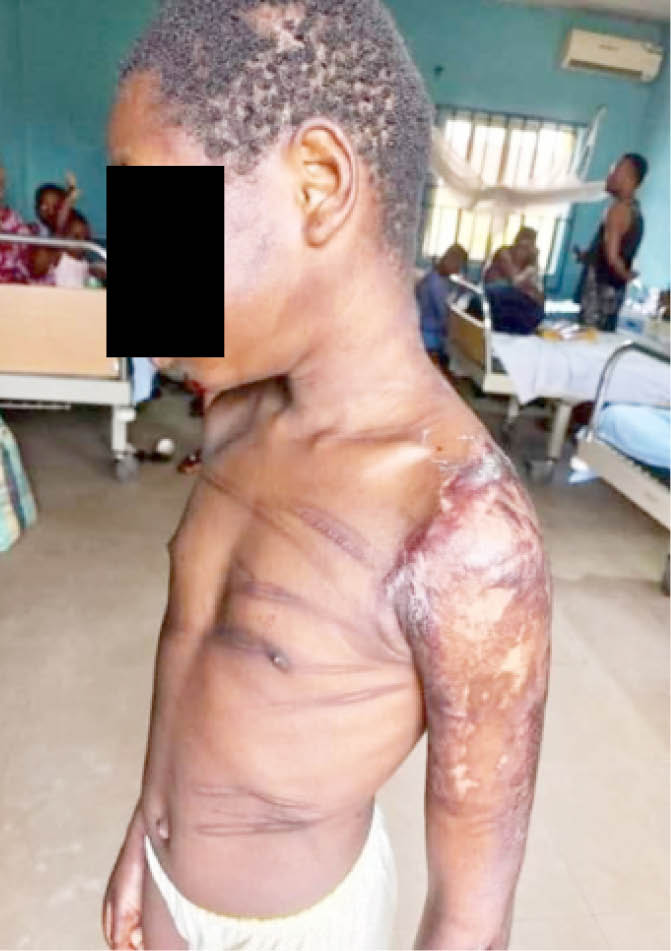Child labour is a big menace that is spreading in Nigeria. However, today’s realities show that the girl child is 80 per cent more likely to be assaulted and sold into child labour than a male child. Daily Trust reports.
Within the Nigerian household are young girls who are employed to serve as maids. Some of these girls, who are as young as 10, are left to bear the burden of household chores that are way above them. Many of their bosses believe that as a girl-child, she should be able to do any household chores because of her gender, her age notwithstanding.
- Intrigues as PDP bigwigs battle for 2023 presidential ticket
Despite huge pay, senators, reps, fleece aides
As a child, you’re taught that boys do the handy work while the girls belong to the kitchen and do the majority of the household chores in a home, and through that concept many have submitted to the idea of having only the female gender as maids. Another interesting fact is that the chances of meeting a boy child in the house serving as a maid is very low as compared to the girl child in present-day Nigeria.
The underlying factor which stays hidden and continues to push the girl child labour is the fact that most of these girls are exploited or maltreated by the fellow women whom they have been sent to work for.
“It’s sad to know that a fellow woman who understands the pains and joys of motherhood could bestow upon another person’s child such cruelty,” says Amina Shuaibu, a mother of three.
Last week, an image surfaced on the internet showing Ifunanya, a 10-year-old girl in Abia State who had been doused with hot water mixed with pepper by her boss simply because she broke a plate.
Cases like this tend to be very frequent in Nigeria.
Most times we wake up to new gory stories of how maids have been maltreated and some cases killed by their guardians. This year alone over 50 cases of various degrees of abuses meted out on maids by their various guardians over minute issues. Most of these young girls are raped and most times made to undergo abortions and trauma with no one fighting for their rights. The Ochanya saga is still fresh on our minds, all she wanted was good education, three years after even in death she is yet to get justice as her oppressors are yet to be brought to book. There so many Ochanyas out there that are yet to get justice and many more whose hopes continue to be dashed.
Children whose parents have no option of how to cater for the family give out their young girl-child to become maids for average and wealthy families in cities. These girls are often maltreated by those they work for. Some of them are left with little or no food, improper clothing, poor living conditions and are most times sexually and domestically abused by the people they work with.
The Borgen project, an International NGO that addresses hunger and poverty, noted that according to the International Labour organisation, Nigeria has 15 million children who are serving as child workers and it is also the highest recording rate in Nigeria.
In Nigeria, majority of these girls are often gotten from the rural areas across the country. Reports have shown that there’re organized networks within most states responsible for facilitating the transportation of different girls to parts of the country to work as housemaids.
A young lady identified as Christy told Daily Trust on Sunday that she had been serving as a house help since age 14. She narrated that she had been told by her mum to follow a certain aunty who was going to give her access to a better life. She further explained that “I’m currently 21 and I’ve been serving as a maid since I was 14. This is the second household I’d be working with. After I left the first one, I hawked soft drinks and after a year, I looked for another job as a house help.”
She stated that on getting to Abuja from the East, where she lived with her mom, she wasn’t given the opportunities she was promised.
“When I started working in the first house I was taken to, I barely ate nor slept. I had to wake up early to make sure the children were ready for school and the house was clean. Breakfast had to be made for the family. I wasn’t sent to school as promised by my aunt.”
According to Christy, she was paid N5000 monthly by her boss and if by chance any item in the house went missing or got spoilt, a certain amount will be deducted from her salary and she would often be hit or beaten by her madam.
Christy’s mother, Mrs Prisca Offor mentioned that she had given Christy up as a maid because she didn’t have the livelihood to cater for Christy and her siblings. “I did not have money to take care of all my children so when I saw an opportunity I took it. After I sent Christy to work as a maid, I also sent her other siblings to do menial jobs although those ones still lived with me. “ she said
Mrs Prisca also disclosed that Christy’s original salary was N10,000. However, she had agreed with Christy’s madam at the time that the money should be split into two with N5000 given to Christy and the other half sent to her.
Another woman, Mary Essien, said she had moved away from home when she was young due to domestic violence she had suffered from her dad. At that time, she was only 12 years old and had nothing but her primary school education.
“My aunt and uncle whom I had moved to stay with treated me more like a house help than their niece. However, I must say they catered to my basic needs such as feeding, clothing and education, but there was still a lot of housework left for me to handle. I clean the house, including the kitchen and rooms. I also do laundry for everyone in the house while her children played and watched TV.”
Mrs Okafor, who spoke to Daily Trust on Sunday expressed disgust over the issue. “First of all, I must condemn the idea of employing anyone below the age of 21 as a maid. This is because you expect a maid to be responsible and cater to major needs in the house in your absence. Now, how do you expect a child who is yet to cater for themselves to carry out such responsibilities for your household?” She asked.
“Secondly, it’s fair to say you cannot love every child as much as you love your own children, nonetheless you must treat them with care and a bit of respect and dignity. It will honestly take nothing out of you if you show respect and care to the people that work for you. They are also humans like us and our cherished children.”
Another woman, Mrs Etido, while speaking to Daily Trust on Sunday said most times emotional blackmail is often used by parents of the maids.
“It’s saddening that most of these girls are sent out by their parents so they can bring money back home to cater for the family. I’ve heard stories of where these girls will complain of being assaulted and harassed and all their parents could say was that they should manage and be patient as they were the family’s only source of income.”
“It’s disheartening that a mother will be willing to make her girl-child go through the most inhumane treatment all because of the money her maltreatment brings to the family. Most of these girls aren’t even paid above N15,000 so how much do they actually get to keep for themselves.”
However, Mrs Etido notes that ending girl-child labour won’t be an easy feat as most times it’s the high and mighty in the society that call the shots.
She, however, advised women who have people’s daughters under them as maids to treat them as their own. “You gain nothing by being cruel to another person’s child,” she said.
According to the World Bank, over seven million people are living in poverty in Nigeria; which is a common reason why girl-child labour is on the rise in the country. Although not on their own terms, a lot of these children often find themselves attending such menial jobs just so they can raise money for their selves and their family.
Mrs Chinelo Ogbozor a lawyer, explained that section 28 of the child rights acts clearly states that no child is to be employed outside of their home and family as a domestic servant. It also states that no child shall be employed or work in any capacity except where he is employed by a member of his family on light work of an agricultural, horticultural or domestic character.
She,however, expresses concern over the interpretation of the law and the terms being used which are “home” and “lightwork”. “Where do you consider to be a home for a child? Is it when he’s under his own parents’ roof or where he lives in general. Also, this lightwork which includes sweeping, cleaning of the house, washing the dishes, etc. are often referred to as training for the young ones”. She said.
Mrs Chinelo also pointed out the fact that the bigger issue here wasn’t the fact that the children were being sold into labour, rather it is the maltreatment they receive under the people they work for.
The provision of Section 23 (1) (a) of the trafficking in persons (Prohibition) enforcement and administration act 2015 creates and punishes as an offence the employing, requiring, recruiting, transporting, harbouring, receiving and hiring out of a person under the age of 12 as a domestic worker. and through this act many children have the right to fight for their freedom”
She also called on the National Assembly and all stakeholders involved to review the child’s rights act and define what should be considered as domestic work and labour for children, especially the girl child.In recent times, the Minister for women affairs, Mrs Pauline Tallen has shown commitment towards fighting for the girl child and making sure that their rights are protected.
While speaking at a meeting in July 2021, which was held with the Federal Ministry of Women Affairs and CSOs coalition working on Ending Child Marriage in Nigeria, she stated that “The federal government is determined to protect the rights of the girl-child through working with partners and communities to end all forms of gender-based violence in Nigeria as a strategic decision of the government to promote, protect, and place the girl child to attain her potentials in Nigeria.”
Due to the increase in child trafficking too, the DG NAPTIP, Senator Basheer Mohammed, also called on parents to stop offering their children up for money as they do not know what harsh terrors they go through.
It is hoped that the girl-child in rural areas is one day given an opportunity to develop her potentials so that she can give back to society.

 Join Daily Trust WhatsApp Community For Quick Access To News and Happenings Around You.
Join Daily Trust WhatsApp Community For Quick Access To News and Happenings Around You.


